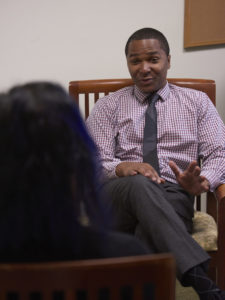Staff Highlight: Adam Meadows, MD
Take a few moments to learn more about Skyland Trail psychiatrist, Adam Meadows, MD.

(Photo from 2017)
Dr. Adam Meadows is a board-certified psychiatrist whose clinical interests include mood disorders, adult ADHD, and mental health concerns affecting college and graduate students. Dr. Meadows previously served as the medical director of psychiatry and behavioral health for WellStar Health System from 2014 to 2016. He is a member of the American Psychiatric Association (APA) and Georgia Psychiatric Physicians Association (GPPA).
Dr. Meadows graduated summa cum laude with a B.S. in Biology from Andrews University, and received his medical degree from Washington University in St. Louis School of Medicine. He completed his psychiatry residency at the University of Pennsylvania where he served as chief resident in his final year.
In recent years, Dr. Meadows has pursued opportunities related to leadership development and public speaking. He is passionate about making a positive impact in peoples’ lives and is committed to efforts to improve social dialogue and reduce stigma around mental health issues.
How long have you been at Skyland Trail?
I have been at Skyland Trail since November 2016.
What made you want to go into the mental health field?
I have always been curious about how the mind works and sensitive to how people think and feel. I had an excellent experience in a psychiatry elective I took during my final year in medical school which helped solidify my decision.
What’s your favorite part about working at Skyland Trail?
I really enjoy being part of a team and a community that is devoted to mental health recovery.
What’s one way you practice self-care?
I prioritize having quiet time alone to reflect and set intentions for how I want to feel and show up for the things I care about.
What are some myths you’ve heard about therapy (or medications)?
I think there are misconceptions that psychiatric medications change your “personality” or alter the essence of who you are. That is not the case. Medications are designed to reduce the frequency and severity of symptoms of mental illness that affect how we think, feel, and act.
How do you think the field of mental health treatment has changed since you started practicing?
There has been significant growth in the relationship between mental health treatment and technology in recent years. There are apps to track symptoms, practice mindfulness, connect with peers in recovery, and much more. The COVID-19 pandemic has also increased the need and use of telehealth treatment services.
What (or who) inspires you?
I am inspired by people who see beyond themselves and reach for larger meaning and purpose in their lives.
Favorite mantra or cheerleading statement?
Stay present and trust the process.
If you could go back in time, what advice would you give to your younger self?
Slow down. You can’t get it wrong. Every experience you have is contributing to your growth.
Listen to Dr. Meadows on the Silence the Shame podcast.
Learn more about Dr. Meadows’ book “A Prescription for Living with Purpose: Maintaining Hope, Healing, and Connection as You Create the Life You Were Destined to Live”

